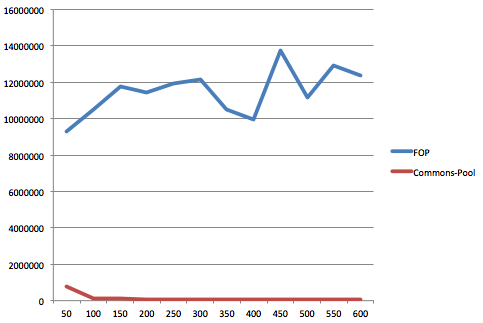FOP, a lightweight partitioned object pool, you can use it to pool expensive and non-thread-safe objects like thrift clients etc.
FOP is implemented with partitions to avoid thread contention, the performance test shows it's much faster than Apache commons-pool. This project is not to replace Apache commons-pool, this project does not provide rich features like commons-pool, this project mainly aims on: 1). Zero dependency 2). High throughput with many concurrent requests 3). Less code so everybody can read it and understand it.
First of all you need to create a FOP config:
PoolConfig config = new PoolConfig();
config.setPartitionSize(5);
config.setMaxSize(10);
config.setMinSize(5);
config.setMaxIdleMilliseconds(60 * 1000 * 5);
The code above means the pool will have at least 5x5=25 objects, at most 5x10=50 objects, if an object has not been used over 5 minutes it could be removed.
Then define how objects will be created and destroyed with ObjectFactory
ObjectFactory<StringBuilder> factory = new ObjectFactory<StringBuilder>() {
@Override
public StringBuilder create() {
return new StringBuilder();
}
@Override
public void destroy(StringBuilder o) {
}
@Override
public boolean validate(StringBuilder o) {
return true;
}
};
Now you can create your FOP pool
ObjectPool pool = new ObjectPool(config, factory);
Poolable<Connection> obj = null;
try (obj = pool.borrowObject()) {
obj.getObject().sendPackets(somePackets);
}
Although Poolable.returnObject() and ObjectPool.returnObject(Poolable) are public but they are not encouraged to be used, Try-With-Resouce (AutoCloseable) is dead clean and less buggy (e,g. forget to return in the finally block, or incidently call returnObject() twice.).
Shut it down
pool.shutdown();
The pool will create multiple partitions, in most cases a thread always access a specified partition, so the more partitions you have, the less probability you run into thread contentions. Each partition has a blocking queue (JCL wait-free CAS/LLSC based) to hold poolable objects; to borrow an object, the first object in the queue will be removed; returning an object will append that object to the end of the queue. The idea is from ConcurrentHashMap's segments design and BoneCP connection pool's partition design.
The source contains a benchmark test, you can run it on your own machine. On my 2010-mid iMac, it's at least 50 times faster than commons-pool 1.x. As threads increase, commons-pool throughput drops quickly but FOP remains very good performance. The figure belows shows that Commons-Pool 1.x is much slower than FOP, and when the worker threads goes up to 100, Commons-Pool throughput drops dramatically.
I believe Commons-Pool 2.x will be much faster since they rewriten everything. Update: I updated the benchmark with Commons-Pool 2.2, FOP is still 30 times faster than CP 2.2.
To use this project, simply add this to your pom.xml
<dependency>
<groupId>com.haiwanwan.common</groupId>
<artifactId>fast-object-pool</artifactId>
<version>1.0.3</version>
</dependency>
JDK 7+ is required. By default the debug messages are logged to JDK logger because one of the goals of this project is ZERO DEPENDENCY. However SLF4j is supported, checkout this for more details: http://www.slf4j.org/legacy.html#jul-to-slf4j
Apache commons-logging is not supported because: http://articles.qos.ch/thinkAgain.html
